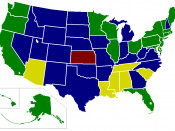My boss can be a jerk. It becomes more apparent when her team is already challenged to ensure the business continues running smoothly but is there really anything an employee can do? There are no laws that make it illegal for her to act that way because the society we live in gives her the right to act any way she wants. That same society has given the business she works for the ability to employ its workforce at-will, not be required to provide any benefits for employees, and watch every move an employee makes. There is help for the employee in the form of a few employment laws passed by federal and state governments that were designed to protect the employee. While most federal and state laws co-exist, there are some incidences where the state laws can be expanded from or stand alone from the federal mandates in order to afford even more protection.
The federal government can only legislate on an issue if it is within the power that has been granted to it by the Constitution. These laws are based on CongressÃÂ power over interstate commerce (Street Law and The Supreme Court Historical Society, 2002). Since the federal governmentÃÂs power is limited, most laws that are passed can only set the minimum of standards. State governments can use these minimums and expand on them to protect the employee further. Workers are protected by whichever labor law gives them the most protection whether it is a Federal or State law, except in a case where the Supremacy clause of the Constitution preempts the State law. An example of this is the Employers Retirement Income Security Act (ERISA), that covers benefits and retirement plans (U.S. Department of Labor, 2006). While federal and state governments operate under the same laws...


